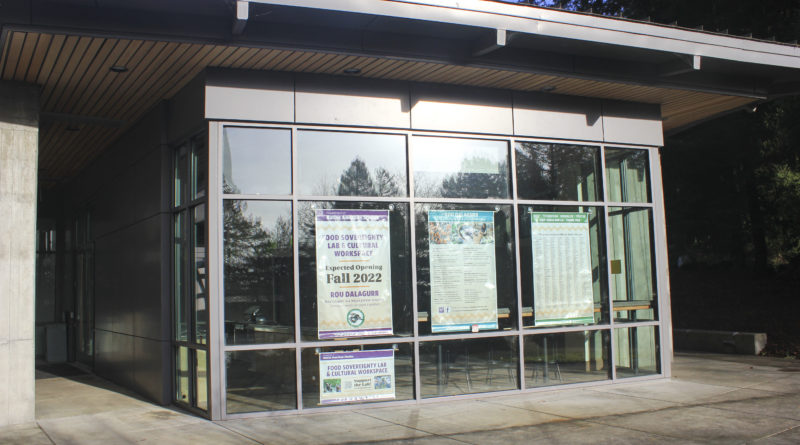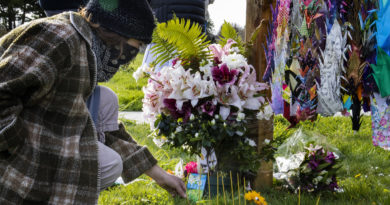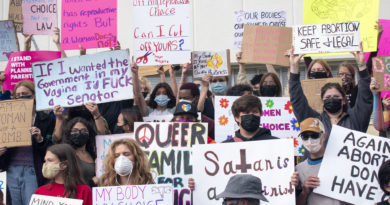The Rou Dalagurr Food Sovereignty Lab opens this fall
Starting fall 2022, the Rou Dalagurr Food Sovereignty Lab (FSL) at Cal Poly Humboldt will open its doors to the Arcata community with a vision of strengthening the bond between the local community, Indigenous Nations, and students at Cal Poly Humboldt through food.
The FSL will be located adjacent to the Native Forum and Goudin’i Gallery in the Behavioral and Social Science building on campus. It will give Native and non-Native students, faculty, staff and community members the opportunity to participate in conversations and hands-on learning activities about sustainable agriculture, Traditional Ecological Knowledge and food sovereignty.
“The FSL is a part of that self determination, support of tribal presence and governance, and leadership,” said Evie Ferreira, a steering committee member and one of the students who originated it. “It supports the current and future dreams of intergenerational push tending to the land in the right way, uplifting Native cultures, uplifting Native governance, leadership, and knowledge. As well as furthering the return of land.”
The FSL will be remodeled this spring to incorporate a learning and community space for Cal Poly Humboldt students to work directly with surrounding communities, tribal nations and national/international scholars alike.
It will include a commercial kitchen, tables, a few computers and equipment for the lab. Outside there will be a gathering area for food prep, including a fire and smoking pit. There will also be a Native plant and food garden with interpretive signs about Native plants. Basketry designs will be throughout the pathways and gardens.
The idea for the FSL began in fall 2019 during an Indigenous Natural Resources Management Practices course in the Native American Studies department at Cal Poly Humboldt.
“The Food Sovereignty Lab is the product of students,” said Cutcha Risling-Baldy, NAS chair and professor for NAS 331. “It’s students who led it, it’s students who made sure that we’re keeping up on it.”
The students from NAS 331 submitted their request in Nov. 2019 to use the former hilltop marketplace space for the FSL to the University Space and Facilities Advisory Committee (USFAC).
USFAC denied the request via email March 2020. According to Carrie Tully, steering committee member for the FSL and one of the students who originated it, they denied the request of the FSL because the space was looked at as “highly sought after.” When the students of NAS 331 asked for more reasons, USFAC had a general consensus that the proposal for the FSL wouldn’t be inclusive for all.
“Our proposal was directly counter to what that statement was,” said Tully. “We were very clear that this was a space to be utilized by the community, by anybody, not just Native American Studies students, this was designed by Native American Studies students.”
During spring 2020, students collected over a 100 letters from tribal leaders, department chairs, students and people across the community responding to the students’ struggle to create the FSL. After stating their appeal at a University Senate meeting, the FSL was approved on May 28, 2020.
The first phase of the FSL goes to the remodel. The second phase will include an outdoor learning space where people can gather and share knowledge. The third phase is still being developed but it will try to incorporate the FSL, Goudin’i Gallery and the Native Forum into an Indigenous homespace for people.
Upcoming Projects
The FSL will host an Indigneous Food Festival on April 16, 11 – 4 p.m. at the Wiyot Plaza, near the Native American Forum, Goudi’ni Gallery and Behavioral and Social Sciences building.
The festival will include Indigenous organizations, food vendors, activities, music, discussion panels, and a showing of the new film “The Range.”
Students and steering committee members raised money for this feature film. It was done by a professional film crew and focuses on food sovereignty in the region. The festival is funded by money raised by students and steering committee members.
During fall 2022, the FSL will accept at least five applicants to be interns for the FSL. The date for applications has not been determined. In the 2023 academic year at Cal Poly Humboldt, there are plans for a FSL lab course that students can take alongside either NAS 331 or NAS 325.
The FSL will also host an online film series. “Gather” will be shown on April 14 at 7 p.m. and “El Cacao: The Challenge of Fair Trade & No Place to Grow” will be shown on April 21 at 7 p.m. People can sign up on NAS Cal Poly Humboldt Instagram: @hsu_nas.
Terms
TEK – The ongoing accumulation of knowledge, practices and belief about relationships between living things being in a specific ecosystem that is acquired by Indigenous people over hundreds and thousands of years through direct contact with the environment, handed down through generations, and used for life-sustaining ways.
Sustainable agriculture – Farming in sustainable ways meeting society’s present food and textile needs, without compromising the ability for current or future generations to meet their needs.
Food sovereignty – Is the right of the peoples to healthy and culturally appropriate food produced through ecologically sound and sustainable methods, and the right to define their own food and agriculture systems.
Rou Dalagurr – A Wiyot phrase meaning: Everyone works or works together.




